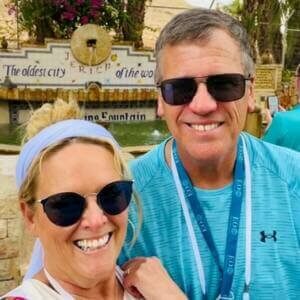Today’s text is the Lord’s call to Abram. Like any journey, the traveler must remember some important points:
- GPS INSTRUCTIONS? (communication between the Lord & Abram)
- WHERE TO PITCH THE TENT? (where to stay)
- WHICH WAY TO GO? (which direction).
Consider the three legs of this journey.
To Schechem in Canaan. The Lord “spoke” to Abram. Although we don’t know whether it’s with his ears or heart, Abram “hears” Canaan. Abram leads the entourage to Schechem and sets up camp. Schechem will become an important place for the Hebrew people (for instance, Jacob will be buried there; and later as the capital of the Northern Kingdom). At the tree of Moreh, the Lord appears to Abram and promises that Abram’s ancestors will one day own the land. Abram builds an altar and offers worship.
Abram’s next stop is the hill country of Canaan. Abram decides to stay in this valley where Bethel is to the west and Ai is to the east. A look at the Hebrew language is valuable. Bethel means the house of God; and Ai means ruin, destruction. Is Abram asking the Lord for protection and guidance for the next leg of the journey? Abram builds another altar, but this time Abram initiates the conversation with the Lord. Does he head East or West? Heading East might lead to danger and ruin, as Ai suggests. Bethel sounds very safe, with its sense of being the house of God. But in Hebrew thought, time flows from East to West (like the written language on the page). Ur—where they originally began—lies toward the east. It was also thought that God moves from East to West, and while he might meet the Lord on his journey, Abram would not be traveling with the Lord. [See Matt’s Bibleblog. Also, search “DIRECTIONS IN THE BIBLE.”)
What does Abram discern as he kneels at the altar facing east? Perhaps the Lord indicates that Abram should follow his right hand, which would indicate a southern direction.
Final Leg of the Journey. Abram sets out southward toward the Negev, an area very opposite Harran. It was a dry, arid desert. Sparsely populated, it had none of the fine social aspects of Harran. The Lord’s call was continuing to lead them into the unknown, into places where dependence on God’s provision and mercy would be paramount.
The promises of nation, recognition, and progeny will begin in the unknown—with God alone.

Pastor John Locke lives in Fayetteville, NC where he is pastor of St. James Lutheran Church. He and Anna Lisa have been married almost fifteen years. She is active in church life, writing and teaching adult Sunday School programs and bringing artistic beauty to worship life.
To Consider
1. Reflect on times when you have felt called (motivated, encouraged, urged) to a new place or job or decision with no clear directions or understanding of what the new “place” would be like. How did you feel? What were your prayers with God like?
2. The unknown—whether it be neighborhood, school, job, or church—can be frightening and anxiety-filled. What are some of the ways we cope and manage those stressful situations?
Prayer
Guiding Lord, you led Abram and Sarai in their journey and you taught them to receive and be your blessing. So guide and teach us, so that we might focus more on how you provide blessings to us and how we can be blessings to others. In the name of Christ we pray. Amen.
